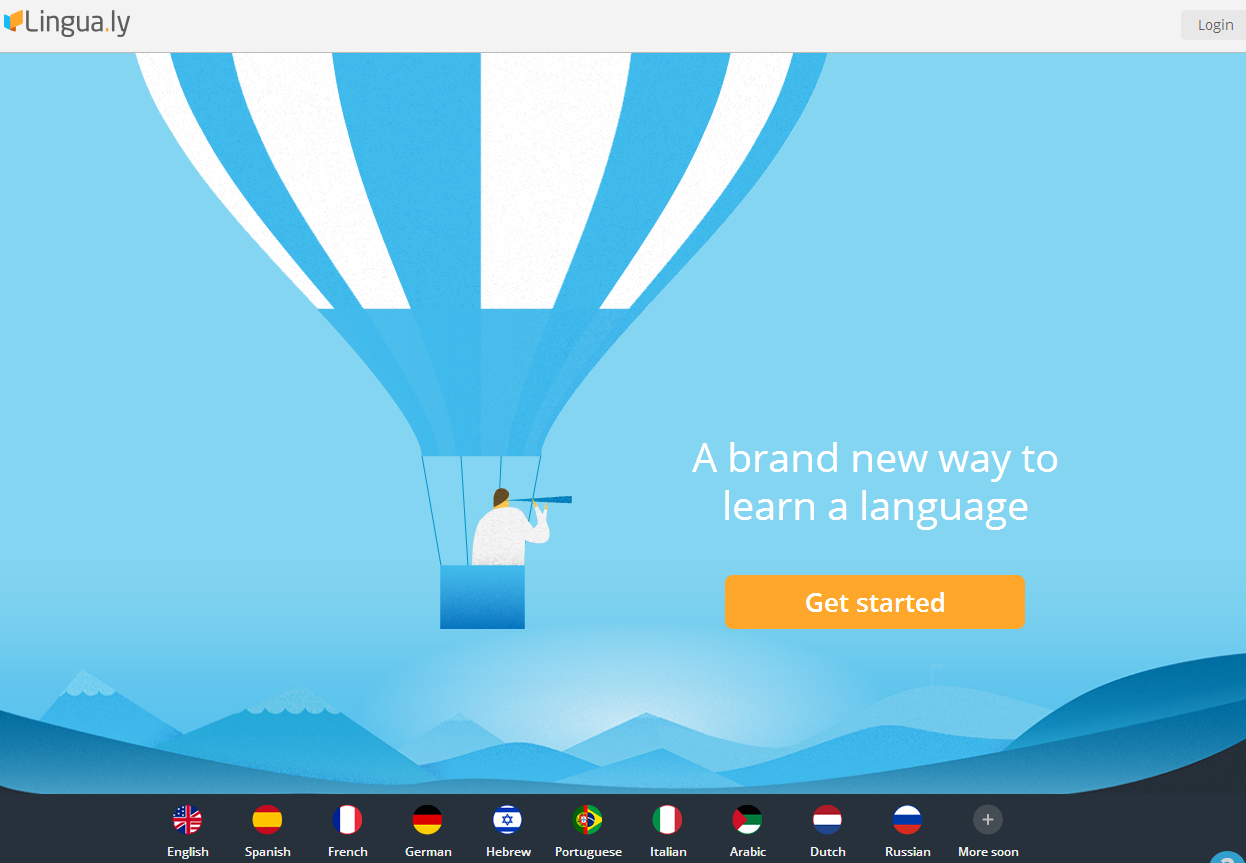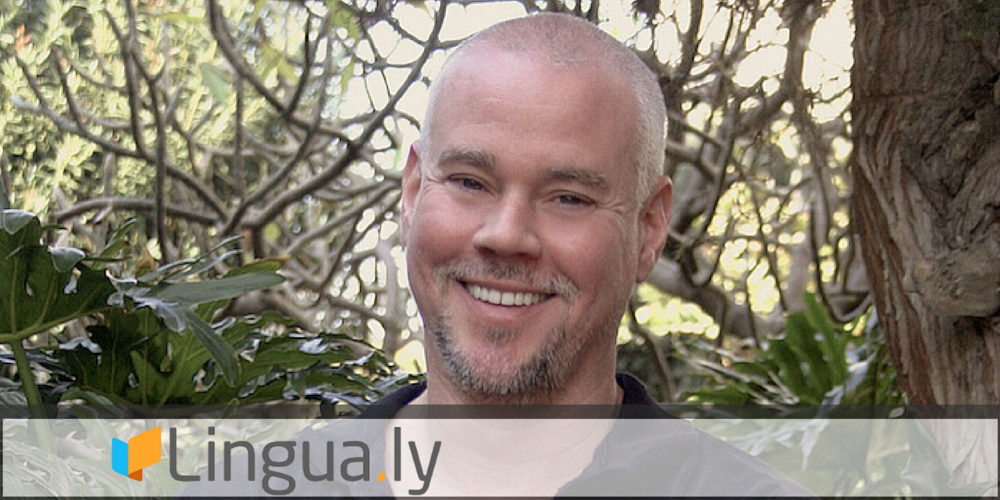Today we meet Dr. Jan Ihmels founder of the new language learning app: Lingua.ly.
Lingua.ly is a great way to enhance your vocabulary anytime, anywhere. Lingua.ly’s blended learning solution can be used as a stand-alone product or to complement language classes and self-study. It is cloud synced and operable via desktop or mobile, supporting 18+ dictionary languages.
Q: Please tell us a little bit about your company – what is Lingua.ly all about?
Lingua.ly helps people learn languages. Instead of traditional lessons or translation activities, we throw our users into the deep end and give them an immersion experience that’s a little more accessible than hopping on a plane to France or Spain, not to mention much cheaper, as Lingua.ly is a free solution.
We base the experience around an adaptive feed of foreign newspaper articles a d then provide all of the tools our users need to make sense of the language the articles contain. You can look up words with one of our three smart dictionaries (including Google), create flashcards which the system assembles by taking an image from Microsoft Bing, an audio bite from sound database Forvo, and an example sentence from Tatoeba. Additionally, you can then master vocabulary with a fun practice game that adjusts study intervals to fit every individual’s unique forgetting curve.
We help you know when to learn new words and when to review the words you already know. You remember vocabulary better because you’re learning words you actually care about. And, you achieve a more in-depth understanding of the language and culture because you are learning from context. We’re a very dynamic learning platform made up of cloud-synced web and mobile apps, both iOS and Android, as well as a browser extension for Google Chrome so our users can look up new words from foreign websites.
Q: Please tell us a little bit about your background and how you started your company?
My background is actually in Physics, Computational Biology and Programming, but I’m a life-long language learner and polyglot. In fact, on a daily basis I end up speaking my second (English) and fourth (Hebrew) languages more than my native tongue (German). When I was working on my Masters at Cambridge University, I was studying science but was also really passionate about Russian. So passionate in fact that I was the only German native-speaker who was also editor of the Russian language newspaper! I used to do many of the things users of Lingua.ly can do today, reading newspaper articles on topics I cared about, looking up new words, feeding the words into a spaced repetition algorithm.
I spent the next ten or so years working in programming and developing algorithms that could handle big data sets. Eventually, I met my co-founder Dr. Orly Fuhrman who is also a language lover with a Phd in Cognitive Psychology from Stanford and we spent two years creating the Lingua.ly algorithm before launching our proof of concept in August 2013.
Q: What are some of the projects you are working on right now?
Since we’re a startup, we’re always innovating and right now the team is looking into some premium features we hope to release this spring. We’re also looking at integrating a new software that will help Lingua.ly optimize its understanding of how a word functions in a given sentence so we can provide a more in-depth flashcard for users. We’d like to be able to give our users more accurate definitions and parts of speech as we think this kind of information is important. It’s cutting edge technology though and therefore it’s not that easy. We’re working with some of the most innovative companies in the field and so we’re really excited about this “super dictionary” and its potential to disrupt the industry.
Q: What are your plans for the future, how do you plan to grow this company?
In the past 10 months, we added half a million new users so we’re very growth focused right now and are currently integrating Lingua.ly’s technology with the largest textbook maker in Israel to continue this trend. Generally though, we’d like to concentrate on more international growth in target markets like Brazil, Russia and China and begin targeting new user groups in the US and UK, such as college students, who could really use an app like ours to learn a new language or study abroad. Lastly, we’re trying to make things easier for beginners for whom the system in its current state is slightly less accessible (we’ve got big plans to change that!). One thing is for sure, for Lingua.ly to grow, maintaining a flexile system is key.
Q: How do you bring ideas to life?
I take action. I think that’s one of the most important things you can do as an entrepreneur and a CEO. Lingua.ly is powered by an amazing, talented and highly-skilled team and our brain storming sessions can generate ideas that are nothing short of genius. It’s then up to me to lead the way. I first ensure the ideas are practical, possible and beneficial and then scale releases down to an MVP that we can actually build and deliver on time. You can bring anything to life if you do your research and plan accordingly.

Q: What’s one trend that really excites you?
Big data. The potential for Lingua.ly and other Edtech startups like Duolingo to take the data we are collecting and provide it to researchers to improve our understanding of how people learn languages is unparalleled today. It’s an Edtech trend that’s not just exciting but could truly change the world.
Controlled research studies and machine simulations have their place, but imagine looking into a private window that shows you the vocabulary acquisition patterns of hundreds of thousands of real regular people learning a language for work, school or pleasure. The potential conclusions and applications are limited only by the scope of our imagination!
Q: What were the top 3 mistakes you made starting your business and what did you learn from it?
- Too many product features. It’s probably the classic startup situation but we built a product that could do everything and then realized our users were mainly using it for two or three specific things. Since then, we’ve started to rely heavily on analytics to see which of Lingua.ly’s features are the most valuable to the current user base, which in turn helps us determine what to build next.
- Not enough onboarding. In the beginning we offered our users a lot of choice and quickly learned that the best way to get someone to give up on your product is to leave them without any direction. We’ve gotten much better at onboarding and user tutorials since then.
- An overly ambitious development schedule. Developing a quality product takes time and you always have to factor plenty of testing and bug-fixing into your development schedule. As most of what we do at Lingua.ly involves integrating new technology and acting on the latest mobile trends, there’s always a learning curve, even for experienced developers. We’ve since learned to factor this in to ensure timely launches and quality releases.
Q: How do you go about marketing your business, and what has been the most successful form of marketing for you?
We do a lot of marketing through content creation, which in turn we share on our social media platforms. As we’re a startup, we can’t afford to pay much for marketing efforts yet which leaves content and partnership as our two major tools. For example, we partnered with the Student Language Exchange on their Lift Off with Language contest this past fall, which gave us a lot of exposure in to American university students. We’ve also worked with italki. But so far, our blog has been our most successful tool as we produce high quality and frequent content for both language learners and teachers.
Q: What would you say are the top 3 things you need to be a successful entrepreneur – and why?
- Passion. You have to love what you do you to put up with what it takes to start a company.
- Chuzpe. Too much respect for boundaries and you’ll have a hard time breaking them and doing something disruptive.
- Broad set of interests. It’s crucial to be able to think outside of the box.
Q: What are the top 3 online tools and resources you’re currently using to grow your company?
- Sensor Tower– It’s an essential tool for ASO and growth and mobile apps are inextricably linked these days.
- Google Analytics / Mixpanel- We monitor our growth trends very carefully across many countries so we can be smart about our PR and marketing efforts and capitalize on trends. A good analytics tool is a must.
- Slack – As our company grows, so does our team and having a history of our work, organizing our efforts and working in sync is crucial.
Q: What are three books you recommend entrepreneurs to read?
- Founders at Work (Jessica Livingston)
- Zero to One (Peter Thiel)
- The Innovators (Walter Isaacson)
Q: What is your favorite entrepreneurship quote?
“Success is not the key to happiness. Happiness is the key to success. If you love what you are doing, you will be successful.” -Albert Schweitzer
Q: How can our community get in touch with you?
I have profiles on LinkedIn and Twitter @Janihmels but you can also just send me an email at info (at) lingua.ly.








